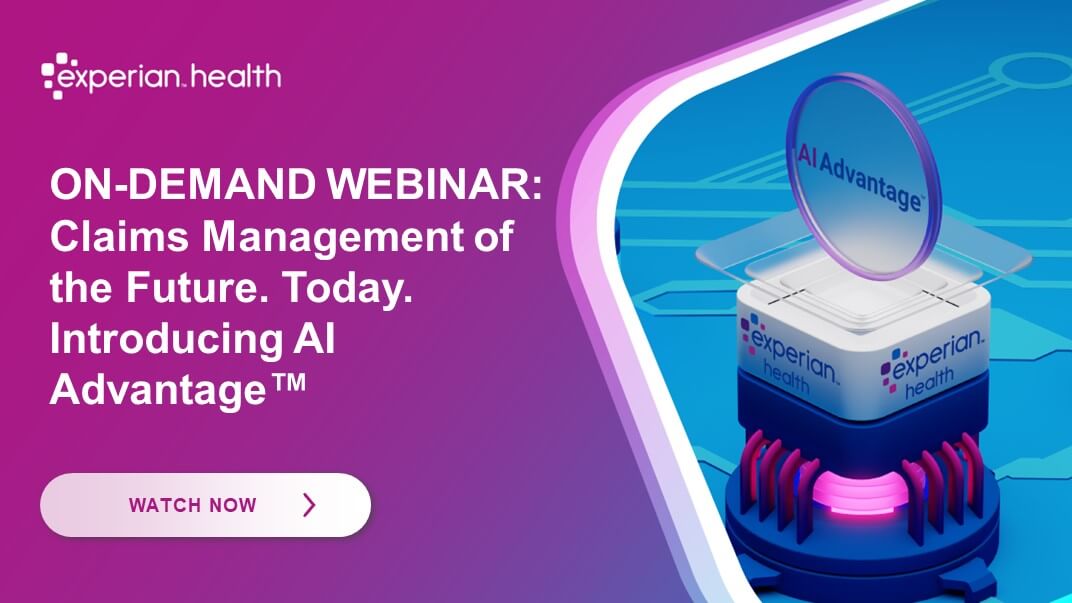AI technology in healthcare: How it’s transforming the industry
Uncategorized
October 28, 2025

Key takeaways:
- Artificial intelligence (AI) is changing how healthcare organizations operate, but while most providers believe in its potential, adoption is uneven.
- As payers use AI to control costs, providers must apply the same technology to address rising claim denials and data quality challenges.
- Experian Health’s AI Advantage
 and Patient Access Curator
and Patient Access Curator help providers prevent denials, improve efficiency and strengthen financial performance.
help providers prevent denials, improve efficiency and strengthen financial performance.
AI is transforming every part of healthcare. In the doctor’s office, it supports faster diagnoses and treatment decisions. At the front desk, it helps verify coverage and schedule appointments. And in the business of healthcare, AI’s ability to interpret vast amounts of data is changing how claims are reviewed, processed and paid.
But transformation is not without challenges. As providers adopt AI and machine learning (ML) to improve care and operations, payers are using the same technology to control costs and make faster coverage decisions. According to the American Medical Association, 61% of physicians believe AI is increasing prior authorization denials. Strategic use of AI is the only way to keep pace and remain competitive.
This article outlines what providers need to know about using AI in healthcare, including how Experian Health’s AI Advantage and Patient Access Curator use AI to prevent denials, improve efficiency and strengthen financial performance.
Understanding AI technology and machine learning in healthcare
AI refers to technology that performs tasks that require human-like reasoning, such as recognizing patterns, interpreting data and solving problems. It learns from experience, spots trends a human eye might miss and generates recommendations based on what users want to achieve.
Machine learning is a subset of AI that improves performance over time, helping healthcare organizations turn their own complex information into practical insights. Because these models are trained on each organization’s unique data, they can adapt to local patterns and workflow differences, making their predictions far more accurate.
Clinical and operational applications
AI and ML are now used in many areas of clinical care, such as:
- Improving diagnosis by analyzing medical images with greater accuracy.
- Accelerating drug discovery by tracking side effects and treatment outcomes.
- Improving surgical safety and precision through robotics.
- Supporting patients in managing their own health through wearables and remote monitoring.
On the operational side, AI helps staff work smarter and faster. Patient access teams use AI to verify insurance, forecast demand and manage scheduling, while revenue cycle leaders use it to reduce manual work and improve claim accuracy.
Experian Health’s State of Claims 2025 report found that 69% of organizations using AI solutions have seen fewer denials or higher resubmission success rates, reflecting measurable gains in both efficiency and financial performance.
How AI technology in healthcare can prevent and reduce claim denials and boost financial performance
Despite these gains, denials are still rising, revealing persistent problems with data quality. More than half of providers (54%) in the State of Claims report say claim errors are increasing, and 68% find it harder to submit clean claims than they did a year ago.
On top of this, keeping up with payers’ use of AI is challenging. American Medical Association President Bruce A. Scott notes, “emerging evidence shows that insurers use automated decision-making systems to create systematic batch denials with littleor no human review.”
In contrast, on the provider side, around 90% of denials require manual rework, contributing to a widening technology gap that slows reimbursement and puts pressure on already stretched teams. Experian Health’s AI-based solutions can help close this gap.
Capture accurate data from the start with Patient Access Curator.
Patient Access Curator uses AI and machine learning to automate front-end eligibility and authorization workflows. It verifies eligibility, insurance coverage and reduces the data errors that often lead to downstream denials. Improving data quality before a claim is created helps organizations submit cleaner claims, reduce delays and deliver a better patient experience.
Predict and prevent denials with AI Advantage
In a recent webinar, Eric Eckhart of Community Regional Medical (Fresno) and Skylar Earley of Schneck Medical Center discuss how AI Advantage helped them take control of their denials management strategy and maximize reimbursement.
“What really sold [AI Advantage] for me was that it’s looking at my data. It’s not looking at Skylar’s data in the Midwest. It’s looking at my data in central California. We have lots of little payers that do their own thing, and it’s learning from my information, my actual denials that are happening. If the payer shifts, the model’s going to follow that and let me know about it.”
— Eric Eckhart, Director of Patient Financial Services at Community Medical Centers
AI Advantage takes a two-pronged approach to reduce the risk of denials and expedite rework:
- AI Advantage – Predictive Denials examines claims before submission and calculates the probability of denial based on historical payment data and undocumented payer behavior in real-time. High-risk claims can be edited before submission to reduce the risk of denial.
- AI Advantage – Denial Triage evaluates and segments denials based on the likelihood of reimbursement and prioritizes the work queue accordingly. It learns from past decisions to formulate recommendations with increasing accuracy, so staff can focus on denials that will be most likely to yield results.
Key challenges of implementing AI technology in healthcare
Interestingly, the State of Claims survey suggests confidence in AI outweighs adoption. While 67% of providers believe AI can improve the claims process, only 14% use it to reduce denials. This suggests some caution around the practicalities of AI implementation.
For smooth implementation of AI technology, providers should consider three essentials:
- Data quality:AI tools are only as good as the data they analyze. Partnering with a reliable third-party vendor can help providers ensure that data is error-free and usable.
- Integration: New tools must fit easily with existing workflows and systems. A single-vendor solution can mitigate interoperability issues. For example, AI Advantage fits seamlessly with ClaimSource®, reducing disruption.
- Compliance and security: Solutions must comply with data privacy and security regulations, like HIPAA, to avoid financial and reputational risk and maintain patient trust.
FAQs
AI in healthcare uses algorithms and machine learning to analyze data, support clinical decisions and automate administrative tasks.
AI technology automates claim reviews, predicts denials and prioritizes claims to maximize reimbursement efficiency.
Tools like Experian Health’s AI Advantage and Patient Access Curator integrate with existing claims management workflows to predict and prevent denials, automate reviews and improve front-end accuracy for faster reimbursement.
As predictive analytics, natural language processing and automation advance, providers that use AI strategically will see greater efficiency and faster reimbursements. With payers and competitors accelerating their AI adoption, understanding where and how to apply these tools will be essential to staying adaptable and financially resilient.
What’s next for AI technology in healthcare?
As predictive analytics, natural language processing and automation advance, providers that use AI strategically will see greater efficiency and faster reimbursements. With payers and competitors accelerating their AI adoption, understanding where and how to apply these tools will be essential to staying adaptable and financially resilient.
See how AI Advantage and Patient Access Curator are helping Experian Health’s clients transform healthcare operations.
The post AI technology in healthcare: How it’s transforming the industry appeared first on Healthcare Blog.


